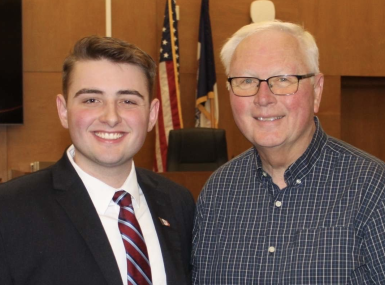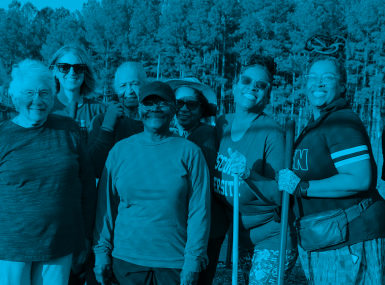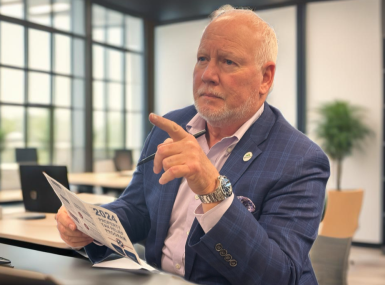Announcing 2024 NACo Achievement Award Winners
Upcoming Events
Related News

Since 1970, the NACo Achievement Awards have recognized outstanding county government programs and services. Through a non-competitive application process, noteworthy programs receive awards in 18 categories that cover a vast range of county responsibilities.
NACo is pleased to announce the winners for the 2024 Achievement Awards. Explore the Best in Category winners below.
Jump to Section
Since 1970, the NACo Achievement Awards have recognized outstanding county government programs and services. Through a non-competitive application process, noteworthy programs receive awards in 18 categories that cover a vast range of county responsibilities.
NACo is pleased to announce the winners for the 2024 Achievement Awards. Explore the Best in Category winners, as well as the full list of winners below.
Arts, Culture and Historic Preservation
Leon County, Fla.
Crosswalks to Classrooms – Dempsey Mayo Road Initative
In 2023, Leon County partnered with the Knight Creative Communities Institute (KCCI), the City of Tallahassee, and other local partners to introduce the Crosswalks to Classrooms initiative. Through this program, ordinary crosswalks and intersections near schools throughout Leon County have been transformed into functional works of art. Decorating crosswalks with colorful artwork helps make drivers aware of crosswalks where pedestrians may be present and promotes safer pedestrian crossing.
KCCI engaged nearby schools, neighborhoods, and organizations, while utilizing traffic patterns, speed and crash data provided by the County, to identify potential sites for these new intersection and crosswalk asphalt art projects to improve safety for students and drivers as they travel to and from school.
More than 14 artistic crosswalks were implemented near seven schools throughout Leon County, directly benefiting more than 3,500 school children. Notably, in November 2023, the County and KCCI celebrated the unveiling of the latest asphalt art project along Dempsey Mayo Road – which involved the first elevated artistic crosswalks to be installed at three project sites in proximity to a nearby elementary school and the Westminster Oaks retirement community.
Recognizing the exceptional amount of pedestrian traffic in the surrounding area, this critical project site was identified as recent incidents of speeding has jeopardized the safety of pedestrians with average daily traffic volume exceeding 3,000 vehicles per day (which is anticipated to increase to 7,500/day by 2030). This project was also the first series of crosswalks completed under the initiative using thermoplastic designs that will stand up to the high traffic counts on the road.
Children and Youth
Stearns County, Minn.
Juvenile Community Action Team (JCAT)
The Stearns County Juvenile Community Action Team (JCAT) was established in 2022 to be proactive with youth and families who were disparately at risk of child maltreatment and criminal justice involvement. JCAT focuses on high-acuity youth with significant behavioral and mental health needs who are at risk of being sheltered in the hospital, jails, or county buildings due to a lack of community and residential services. Early identification of youth occurs by working with a multi-disciplinary team consisting of schools, law enforcement, the health care system, mental health providers, probation, and social services staff.
Youth and families are now effectively served by providing these early multi-systems interventions and guidance to assist in building a sense of belonging and success. Prior to implementation of the JCAT team, 22 children were housed for 67 days in the county building (in total), while staff desperately sought placement options. After implementation of the JCAT team, we reduced our out of home placement budget by $400,000.00 dollars and the number of children who enter care was reduced by an average of 24 percent.
Civic Education and Public Information
Harris County, Texas
Building Civic Champions: The Harris County Precinct 2 Student2Government Leadership Academy
The 2023 Harris County Precinct 2 Student2Government Leadership Academy was designed to help teens foster a culture of service, build character, establish a place of belonging, and develop strong social, emotional, and civic leadership skills. With the help of different Harris County Departments and community partners, the Student2Government Leadership Academy created a safe space for teens to direct their energy and passion for civic leadership. Students applied using the online portal used to apply for actual Harris County jobs, giving many of them their first experience using an online Human Resources system. Participants were eligible for a $200 stipend, provided by Precinct2Gether, our non-profit partner for Harris County Precinct 2, upon completion of all components of the academy. Fellows also received a laptop computer provided by Harris County Public Libraries.
Community and Economic Development
Napa County, Calif.
Napa County Affordable Accessory Dwelling Unit Forgivable Loan Program
Addressing Napa County’s housing challenge, our project offers a creative, scalable solution: an accelerated Affordable ADU (Accessory Dwelling Unit) construction program via forgivable loans.
In Napa County, this program scales housing development at lower “per-door” costs by leveraging private sector finance through its public-private model. It diversifies neighborhoods by creating access to affordable workforce housing within higher income established residential neighborhoods. It innovatively increases housing density without the need to re-zone for multi-family housing. And most importantly, it strengthens the social fabric of our community by addressing the multi-faceted needs of homeowners struggling with aging in place as workforce members are struggling to live near where they work, and families needing options to support intergenerational living.
County Administration and Management
Broward County, Fla.
FLL Airport Lost & Found Items Get New Life at Animal Care
The Broward County Aviation Department (BCAD), the operator of the Fort Lauderdale-Hollywood International Airport (FLL), has an ongoing partnership with sister agency Broward County’s Animal Care Division (Animal Care) for a new home for items left at FLL. Through this collaboration, items such as towels, blankets, throws, and shawls not claimed within 30 days from FLL’s Lost & Found Office are given new life at Animal Care to help care for and comfort the animals there.
The donation partnership was formalized in early 2019 but went on hiatus in 2020 and 2021 due to the COVID-19 pandemic. Post-pandemic, the partnership has blossomed into a more formal and structured inter-agency collaboration fueled by Animal Care’s growing need for cost-effective pet-care amenities and FLL’s desire to find sustainable and recyclable options for these types of unclaimed Lost & Found items. Last year (2023) was the most active year for airport donations to Animal Care. Over its operational period, donated items have included toys, blankets, towels, comforters, dog leashes, dog collars, doggie carries/bags, dog strollers, bowls, and food. BCAD Lost and Found staff typically deliver items to Animal Care every three months or arrange to have them collected at FLL.
County Resiliency: Infrastructure, Energy, and Sustainability
Durham County, N.C.
Durham County Stormwater and Erosion Control Go Online with GIS and Web-Based Systems
A local stormwater and erosion control program can go through a lot of paper - hardly a sustainable practice. In addition, with almost 300 active erosion control permits and stormwater projects, staff are constantly driving all over the County to inspect sites to maintain compliance. Add in a global pandemic where offices were closed to the public and staff were working remotely (and many continue to do so), and you had a perfect storm – or a perfect opportunity – for a new way to do things. Durham County is now utilizing new innovative electronic methods to limit the amount of paper it both receives and produces and GIS-based tools for managing its stormwater and erosion control program, all in order to increase efficiency, sustainability, responsiveness, and compliance with the goal of protecting and improving water quality.
Criminal Justice and Public Safety
Pima County, Ariz.
Pima County Housing First (PCHF)
The goal of the Pima County Housing First (PCHF) program is to expand and modify a pilot project and implement a Permanent Supportive Housing (PSH) program that will end chronic homelessness for individuals who are impacted by the justice system and living with co-occurring disorders. The desired outcomes of this program include providing safe and stable housing with wrap-around resources for individuals (and their families) exiting the jail, integrating mental health and substance use treatment services, and ultimately breaking the cycle of incarceration for participants (simultaneously improving community safety and reducing costs).
Financial Management
El Paso County, Colo.
Digital Data and Financial Transparency
The Digital Data and Financial Transparency Dashboard for the American Rescue Plan Act (ARPA) fund allocation in El Paso County represents a cutting-edge tool dedicated to advancing financial transparency and accountability in ARPA fund expenditure. This innovative online platform offers quarterly updates on fund allocation, comprehensive details on funded projects, interactive maps for spatial representation, mechanisms for public feedback, compliance monitoring, and user-friendly data visualization tools.
By providing clear insights into ARPA expenditures, this dashboard empowers stakeholders to actively monitor fund usage, make well-informed decisions, and cultivate trust in governmental financial practices. Its user-friendly design ensures easy access for residents, policymakers, and officials, fostering data-driven decision-making and efficient allocation of resources to support community recovery and development initiatives.
Health
Cook County, Ill.
Addressing Food Insecurity among Medicaid Members: FoodCare by CountyCare
CountyCare Health Plan is one of five Medicaid managed care health plans in the State of Illinois. Owned and operated by Cook County Health (CCH), CountyCare is the only government owned, provider-led managed care organization (MCO) in Illinois. CountyCare currently serves over 430,000 members in Cook County.
As part of a broader health plan strategy to address social drivers of health including food insecurity, CountyCare Health Plan developed the FoodCare program, a nutrition program to improve the health and quality of life of CountyCare members. FoodCare is a no-cost wholistic program intended to drive community involvement, address member food insecurity, and manage diet-related disease prevalence.
FoodCare is comprised of three distinct programs for CountyCare members:
- Emergency home delivered meals delivered to the homes of members recently discharged from a hospital stay or referred by their care coordinator or dietician for food insecurity.
- A FoodCare digital application and interactive platform connects members with their own registered dietitian for unlimited dietician visits and helps members with meal planning, shopping on a budget, and food delivery.
- Medically tailored meals for members with specific conditions, and pregnant members with gestational diabetes and hypertension. Ultimately, the goals of CountyCare's FoodCare program are to reduce food insecurity, and increase access to healthy food and health equity.
Human Services
Guilford County, N.C.
Guilford County Adult Resource Team (ART)
The objective of the Adult Resource Team (ART) is to collaborate with Emergency Medical Services (EMS) and Fire partners to provide a stronger service line for patients who need resources and care that exceed normal EMS and Fire capabilities, while simultaneously freeing up current EMS and Fire resources so they can handle medical emergencies and fire suppression/rescue activities.
In current state, there is no continuum of care or resources for many of our patients who have unmet basic needs of daily living. Many of these patients are low-income, homeless, and/or have significant socio-economic disparities. They also often lack a family support system that would normally be available for care or navigation of care. Patients, especially those who lack financial resources or the capacity to navigate these challenges, are left without any other option than to use emergency services (911).
This program would improve services to our underserved and vulnerable communities and improve the diversity, equity, and inclusion of service lines to the community by having a social worker who can provide follow-up and a connection of resources from a central point of care. This team will also improve reporting from EMS and Fire for Adult Protective Services (APS)/Child Protective Services (CPS) referrals as well as acting as a preventive measure for future APS/CPS referrals.
Information Technology
Riverside County, Calif.
Santa Ana River Bottom Collaborative Website
The Santa Ana River Bottom is home to an estimated 200 unsheltered individuals, the largest concentration of encampments in Riverside County. These individuals are exposed to environmental hazards, extreme weather, and vulnerability to victimization. This gives the Santa Ana River Bottom the highest priority for encampment response and mitigation. One single organization can't tackle the environmental and social challenges alone to achieve results. A collaborative approach is necessary to ensure success.
In 2020, a Multidisciplinary Team was formed to address the crisis. To showcase the great work of the team, SARBshare.org was created. The website's purpose is to provide a platform for stakeholders to share collaborative goals, success stories, heat maps, location-specific resources and so much more. While there are numerous agencies fighting to address homelessness, the most challenging aspect of outreach is knowing what resources are available. SARBshare.org has enabled the Multidisciplinary Team to have a centralized location to quickly reach experts for housing, mental health, substance abuse, food banks, and hotlines. By centralizing information, SARBshare.org enhances coordination, facilitates communication, and ensures that those in need can access crucial services efficiently. In the fight against homelessness, this collaborative model will achieve a lasting impact and create positive change.
Libraries
Miami-Dade County, Fla.
Creating Autism Friendly Spaces at the Library
On September 2021, the Miami-Dade Public Library System (MDPLS) was named as an Autism Friendly Partner by the University of Miami-Nova Southeastern University Center for Autism and Related Disabilities (UM-NSU CARD). The partnership is part of a Countywide Autism Spectrum Disorder (ASD) and Neurodiverse Inclusion Program in collaboration with UM-NSU CARD, a resolution presented by Commissioner Raquel Regalado in collaboration with Library Director Ray Baker and UM-NSU Card Executive Director Dr. Michael Alessandri.
Libraries, by becoming fair and more inclusive, have been providing patrons with the opportunity to feel welcomed. This has always been the library’s primary goal. This designation has helped by providing us with the opportunity to continue expanding and enhancing our current programming and services and offer new opportunities, along with more specialized services that cater to the needs of this growing population within our community.
To receive this designation, various components needed to be considered such as all staff being properly trained by completing the ASD (Autism Spectrum Disorder) and Strategies for Inclusivity training provided by UM-NSU Card, create custom social narratives for each of our branches, expand sensory-friendly programs offered throughout the library system to include more autism friendly experiences and neurodiverse programs and the designation of sensory-friendly spaces within our libraries.
Parks and Recreation
Nevada County, Calif.
Visitor Safety and Outdoor Recreation Management for Rural Counties
Nevada County (California) establishes proven collaborative program that provides leadership, solutions and investment in outdoor recreation management and visitor safety at high-use and high-risk destinations.
Visitor safety and management are critical concerns for outdoor recreation communities in California. This program is innovative in its approach to effectively navigate complex issues and systems and serves as a model for advocacy, sharing resources, coordinating messaging, and accelerating on-the-ground solutions to mitigate impacts, improve user safety and experiences and enhance rural economies. County staff and leadership convene member contributors who provide a unique collection of expertise, creativity, relationships, and know-how that has led to local, state, and federal funding and support.
Personnel Management, Employment, and Training
San Diego County, Calif.
Tomorrow's Leaders Today: SD DCSS Nurtures Talent with Student Worker Program
The San Diego Department of Child Support Services’ (SD DCSS) enhanced implementation of the San Diego County Student Worker Program has achieved remarkable success in fostering a positive and productive work environment. By providing students with meaningful opportunities to contribute to the department’s mission, SD DCSS not only benefits from fresh perspectives and innovative ideas but also allows students to gain valuable real-world experiences instrumental in their professional development. This relationship fosters a vibrant work culture that embraces diversity and continuous learning.
Planning
Howard County, Md.
Innovative and Equitable Policies in the HoCo By Design General Plan
HoCo By Design, Howard County’s new General Plan, offers a model for mature suburban communities grappling with issues of housing affordability, public school capacity, equity, and limited land supply. The plan illustrates how new housing types can be introduced in existing neighborhoods while maintaining community character; how new ideas for public school facilities can be integrated into general plans; and how equity in future land use and growth can be highlighted and brought to the forefront.
HoCo By Design’s overarching objective was to identify a growth and conservation strategy for the next twenty years that is more equitable, predictable, sustainable, and achievable than previous general plans, and which would preserve and protect the qualities of Howard County that make the community so special while tackling the challenges ahead. The plan explores mixed-use redevelopment as its primary strategy for accommodating future growth, while also detailing 78 policies and 323 implementing actions to address a variety of topics tied to growth, conservation, and infrastructure.
Of these, four broad categories of polices and actions stand out as innovative from a comprehensive planning perspective: 1) “missing middle” housing; 2) public school facilities; 3) advancing equity through land use; and 4) redeveloping mixed-use “activity centers.”
Risk and Emergency Management
Orange County, Fla.
Volunteer Emergency Responder Program
The Orange County Government Volunteer Emergency Responder Program provides the opportunity for non-essential personnel to gain certification in emergency roles such as Shelter Manager, 311/People with Special Needs Call Taker, Points of Distribution Manager, and Emergency/Department Operations Coordinator. Under an emergency declaration, all non-essential personnel are sent home with pay while the County is officially closed for normal business. This program allows them to serve the community should they choose to do so.
In 2004, this program was developed with specific purpose and results in mind: afford all non-essential personnel the opportunity to train, prepare, and deploy during emergency activations; develop a staffing database of trained personnel to work alongside external partners such as American Red Cross; and to compensate both non-essential certified personnel and essential personnel who, as part of their normal duties, receive emergency pay when working during an emergency.
Since program inception, more than 1,000 Orange County staff have been trained and certified to better plan for and implement robust preparedness measures in sheltering, sandbag distribution, and waste management to name a few. Additionally, this program fosters community resiliency through education, engages Community Emergency Response Teams, hosts public expos, and communicates ongoing preparedness messaging throughout the year.
Transportation
St. Lucie County, Fla.
St. Lucie County's Microtransit Program
St. Lucie County, Florida supplied public transit accessibility for transit desert areas by adding a new micro-transit zone to better accommodate a growing community and reduce traffic congestion.
With the increase in people moving into the county, having reliable, cost-effective public transit options is becoming a higher priority within the county. Transit staff is continuously looking for ways to streamline access and provide the best possible ways to traverse the county.
In the past, when staff presented at educational or outreach events, the public would say they had no idea there was transit in the county. Now, members of the public react positively with comments such as, “I ride the ART buses,” or “I think your new ART on demand program is great.”
Volunteers
Gwinnett County, Ga.
Harvest Gwinnett Community Garden Ambassador Program
Live Healthy Gwinnett’s Harvest Gwinnett Ambassadors represent a dedicated cohort of 22 individuals, with two resident gardeners selected from each of our 11 vibrant community gardens. These volunteer ambassadors embody a commitment to fostering community engagement and wellness through gardening, leveraging their passion to cultivate spaces where residents can unite to cultivate nourishment, bolster health, and combat food insecurity throughout Gwinnett County.
Comprising a diverse mix of gardening enthusiasts, educators, and community leaders, the Ambassadors bring varied skills and experiences to the table, with a shared goal of nurturing thriving garden environments. While expertise in gardening is welcomed, it is by no means a prerequisite. These individuals unite in their eagerness to lead by example, inspiring others to join the cause. Harnessing their collective drive, Harvest Gwinnett empowers these Ambassadors to spearhead initiatives within their respective gardens, fostering collaboration and innovation. Quarterly meetings provide a platform for knowledge exchange and collaboration among Ambassadors from different gardens, enriching their leadership journey. With a proactive spirit, the Ambassadors actively champion initiatives to fortify the success of our community gardens. From enhancing communication among gardeners to coordinating tasks and facilitating resource requests, their proactive approach ensures seamless operations. Moreover, they are instrumental in the task of harvesting and donating crops, extending the garden's impact beyond its boundaries.
Conference
2024 NACo Annual Conference & Exposition
The Annual Conference is the premier gathering of leaders from the nation’s 3,069 counties, parishes and boroughs.





